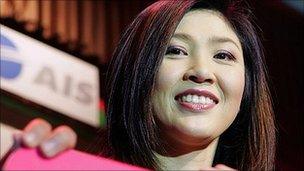Thailand red-shirts mark Bangkok protest anniversary
- Published
Thousands of red shirt protesters converged on the centre of Bangkok to mark the anniversary of last year's crackdown
Thousands of red-shirted opposition supporters have gathered in Bangkok to mark the first anniversary of a bloody confrontation with the military.
The rally came after more than 20 parties registered for a hotly contested election in July.
The main opposition party is challenging the government of Abhisit Vejjajiva.
Buddhist monks began the protest with prayers for more than 90 people killed in last year's protests.
Those demonstrations ended when the army forcibly cleared the red shirts from central Bangkok.
Unreconciled
Many of Thursday's protesters carried pictures of Thaksin Shinawatra, the exiled former prime minister, who is seen as the power behind the opposition.
His younger sister, Yingluck Shinawatra, was chosen this week as the main opposition Pheu Thai Party's candidate for prime minister.

Yingluck Shinawatra, seen as a stand-in for her brother Thaksin, will lead the opposition into the polls
Investigators and a fact-finding body have failed to apportion blame for last year's killings.
The protesters - numbering up to 100,000 at times - had been demanding the dissolution of the government of Prime Minister Abhisit.
He has now called an election, set for 3 July, but tensions remain high in a dangerously polarised political environment.
The opposition draws much of its support from the rural poor in the north and north-east of Thailand. It is challenging the political dominance of the powerful elite centred on Bangkok.
The red-shirts began street protests in March 2010 and occupied the central Ratchaprasong intersection, lined by five-star hotels and shopping centres.
After negotiations between government figures and some protest leaders failed, the soldiers used live rounds and armoured vehicles to break up the demonstrations on 19 May.
They were accused of using excessive force. As they moved in, they came under fire from armed men fighting on the side of the protesters.
Several soldiers were killed and many more civilians, including demonstrators, journalists and medics also lost their lives.
A truth and reconciliation commission was set up to establish the facts behind the violence. But one year on it has yet to make public its findings.
"We've said to the government over and over again, 'if you really want to heal, you need to hold some of your officials accountable,'" said Brad Adams, Asia director for Human Rights Watch.
Instead, the lack of justice is driving the sides further apart, he said.
The BBC's Rachel Harvey in Bangkok says that with an election due in July, Thailand's political divisions are likely to be exposed once more.
The question, she says, is whether differences can be resolved via the ballot box rather than on the street.
The main aims of the protesters now seem to be dovetailing much more with those of the main opposition, she says.
However, the prime minister himself admits that the wounds of May 2010 have not yet fully healed.
"Certainly, if you ask me if there is reconciliation today, I have to say 'not yet,'" Mr Abhisit said in a speech this month.
Thaksin Shinawatra, accused of financing the protest movement while living in self-imposed exile in Dubai to avoid a prison term, remains a hugely divisive figure, our correspondent says.
To his supporters, he is a champion of the disadvantaged who was unconstitutionally forced from power by powerful elites, backed by the military.
To his critics, Mr Thaksin was a corrupt and authoritarian leader who manipulated gullible voters.